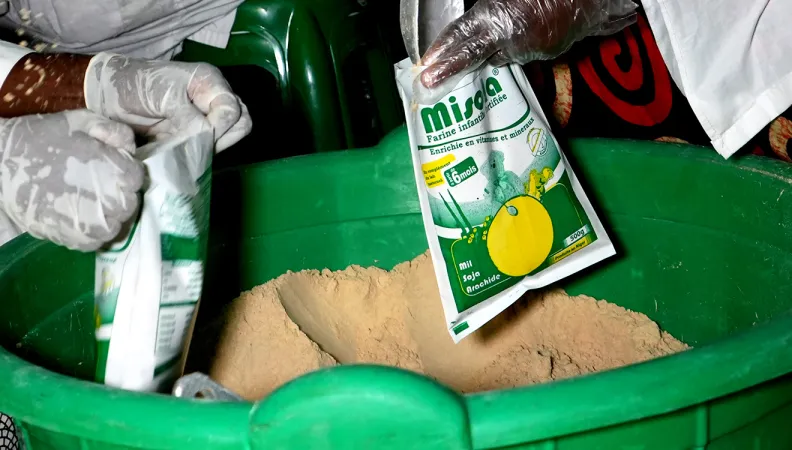Share the page
Tackling Hunger in Niger - with Nutritious, Locally Produced Cereals and Flour
Published on

Niger is stepping up its action to fight malnutrition, in large part with the production of Misola infant flour. The locally produced flour is tackling food insecurity across the country. Co-financed by the Cooperation and Cultural Action Service (SCAC) and Agence Française de Développement (AFD), the Misola program is now set to be extended.
In Niger, “4.4 million people suffer from severe food insecurity and will need food assistance between June and September 2022,” according to the Prime Minister, Ouhoumoudou Mahamadou, whose Government has already adopted a dedicated emergency plan.
On a visit to Niger in late June at the invitation of President Mohamed Bazoum, the French Secretary of State for Development, Francophonie and International Partnerships, Chrysoula Zacharopoulou, said “France stands alongside Niger and will continue to do so, in particular to fight food insecurity. We are providing emergency support, but also long-term action to strengthen agricultural production.”
Further reading: AFD's Sectoral Innovation Facility for NGOs (FISONG)
In this context, Misola infant flour is of strategic importance for the population. Produced in six, soon to be seven, small-scale plants across the country, Misola is a fortified infant flour developed in 1982 by Burkinabe and French doctors to fight malnutrition among children from six months of age. This flour, produced using a mixture of three cereals (millet, soya, peanut), is used in 14 West African countries and will be in others in the future. Misola has been distributed in Niger since 2007.
“With peanut and soya, which are among the ingredients of the flour in addition to millet, it provides a very high level of protein,” says Sébastien Subsol, Cooperation Attaché at the French Embassy in Niger. “Furthermore, developing plant-based protein channels in countries in the Sahel and West Africa is also a key issue.”
Further reading: The Great Green Wall: Restoring Land in Africa
AFD’s support
The Misola program has benefited from the support of the French Embassy in Niger since 2017. The following year, AFD committed €1.8 million via the French NGO GRET.
These funds have financed training for women working in the small-scale plants, as well as the purchase of equipment to ensure food production standards are respected. The purpose is “to ensure the quality and hygiene standards, which are essential for the clients, in this instance the Government, the World Food Program and UNICEF,” says Marie-Hélène Loison, AFD’s Deputy Chief Executive Officer.
Women’s empowerment and national production
At the Niamey plant, 26 women produce the Misola infant flour. There are 73 women in all the country’s production units. “This work has changed many things in my life,” says Warkou Rakia Maïdaji, President of the Women’s Group. “The jobs on offer help to fight poverty. Women can provide for their families.”
In addition to promoting women's empowerment, Misola is a 100% Nigerien system: “The entire chain is located in Niger, from cereal production, for the most part, to the processing of these cereals,” says Cynthia Mela, Director of AFD’s Niamey office. “The flour produced is sourced locally, either by the distributors or by institutions such as the National Food Crisis Prevention and Management Mechanism, so that it can be redistributed across Niger in times of crisis, like right now.”
A short supply chain which “supports the local production channels for these cereals,” says Marie-Hélène Loison. “Here again, this generates income and supports national producers’ organizations.” A virtuous system which now needs to be scaled up to address climate hazards and the low level of modernization in the agriculture sector which expose Niger to recurrent phases of food insecurity.
Further reading: Ukrainian War Worsens African Food Crisis
________________________________________
Future prospects
In addition to the clients, i.e. the Government of Niger and its international partners, the Misola flour is also sold in modern pharmacies, informal markets and is generally available on supermarket shelves at a low price.
More broadly, the future prospects are very positive for Misola. “We expect AFD to continue to support the Misola project, which is essential both to breastfeeding and to the prevention and treatment of malnutrition” says Mamane Aminou Amadou, coordinator of Misola in Niger since 2018. This biochemist by training and specialist in nutrition also wants support for “the creation of other production units across the country to achieve a real national coverage.” “Increasing production and creating other units are aspects which AFD is very willing to support,” says the Deputy CEO of Agence Française de Développement.
The future must also be considered through the dynamics of the European FARM initiative (Food and Agriculture Resilience Mission), led by France, which aims to support local production. The objective is clear, as Marie-Hélène Loison points out: “In the event of a problem of global supply, the countries in question must be more self-sufficient in feeding their population.”
